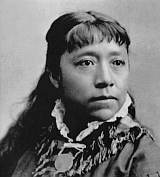Born the daughter of Chief Winnemucca of the Paiutes, a tribe in Nevada and California, Sarah Winnemucca lost family members in the Paiute War
of 1860.
She tried to operate as a peacemaker, using her language skills learned in convent school to work as an interpreter in an Army camp. She went with her tribe to the Malheur reservation in 1872, and when the Bannock War broke out in 1878 she offered her services to the Army. She volunteered to enter Bannock territory when she learned that her father and other tribe members had been taken hostage by the Bannocks. She freed her father and other captives and served as an army scout in the war against the Bannocks.
She spoke out, describing the plight of her people, exiled from their homelands, and the treachery of dishonest Indigenous agents. She drew much attention and was able to speak with President Hayes and Interior Secretary Carl Schurz; promises to return her tribe to the Malheur Reservation were never honored.
She wrote Life Among the Piutes [sic]: Their Wrongs and Claims, published in 1883. Despite passage of Congressional legislation enabling the return of the Paiute land, the legislation was never enacted.

